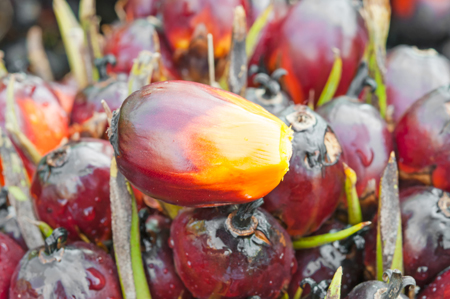 (Wall Street Journal) – El Niño’s impact on agricultural output in Asia is starting to show through in official data, with a near-20% drop in palm-oil production in Malaysia last month the clearest example yet.
(Wall Street Journal) – El Niño’s impact on agricultural output in Asia is starting to show through in official data, with a near-20% drop in palm-oil production in Malaysia last month the clearest example yet.
Dry weather and a choking haze that hung over palm-oil plantations in Southeast Asia for two months last autumn have reduced yields from oil palms, with production analysts and plantation owners now expecting output to remain low for the first half of 2016.
Malaysia’s total crude palm-oil production in January fell 19.3% from December to 1.29 million metric tons, according to the Malaysia Palm Oil Board, which contributed to palm-oil stocks falling 3.4% from the month before. Malaysia, along with Indonesia, accounts for around 85% of global production of the commodity used in products from lipstick to cooking oil.
Concerns about reduced production and tighter supplies have helped palm oil become one of the best-performing commodities in global markets, with prices now up 38% since they reached a six-year low in August. The Bursa Malaysia benchmark three-month palm-oil contract was trading down 2 ringgit to 2578 ringgit a metric ton at 0900 GMT Wednesday.
Palm-oil prices have historically rallied sharply in El Niño years—they rose around 40% in 2006 when the phenomenon was last observed. While El Niño has been present since the first half of 2015, the full extent of the damage is only likely to be known over the coming months due to the growth cycle of oil-palm fruits.
“The anemic production run is likely to continue until June,” and stocks are unlikely to start rising until September, said Dorab Mistry, a director at Godrej International—which has a wide range of businesses including oil-palm plantations—in a speech at the Pakistan Edible Oils Conference earlier this week.
Despite the fall in palm-oil output in Malaysia, some analysts now believe the recent run-up in prices has peaked. Stocks of palm oil remain close to historic high levels, reaching their highest level for the month of January since 2013 last month.
Still, stock levels may already have topped out last year and will continue to fall as production wanes due to the dry weather and seasonally lower output, said Ivy Ng Lee Fang, deputy head of research Malaysia, CIMB.
“We should see production continuing to come off in both Malaysia and Indonesia in February because of fewer working days and the El Niño so…prices will be firm in the near term,” she said.
Palm oil isn’t the only agricultural product to be hit by the El Niño that government forecasters in the U.S., Australia and Japan describe as one of the worst since the 1950s. Rice markets in Asia are starting to tighten due to dry conditions, with production in the region expected to have fallen by 3.1 million metric tons to 670 million metric tons last year, according to the United Nations’ Food and Agriculture Organization.
“As India and Thailand are the world’s two largest exporters, this is likely to tighten export markets, which could support higher prices” while “the draw on stocks is expected to push end-year inventories down to the lowest level since 2007,” said Capital Economics analyst Hamish Smith.
Thai 5% broken white rice is currently selling at $388 per metric ton, up 7% from its average price in December, according to data from the Thai Rice Exporters Association.
Meanwhile the poor monsoon season in India, the world’s second-largest producer of sugar, has likely hit production there, with output for the year ended Sept. 30 expected to be down 3.7% to 26 million tons, according to the Indian Sugar Mills Association.
However, El Niño has left some countries unscathed. Dairy prices have fallen as New Zealand has received plenty of rain, leaving ample grass for cows—meaning production hasn’t fallen as much as many had expected. Dry weather in Australia, meanwhile, hasn’t hurt yields of wheat crops as much as some had feared.




